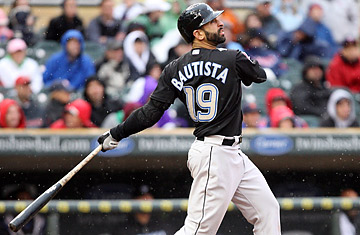
Jose Bautista of the Toronto Blue Jays takes a swing during a game against the Minnesota Twins in Minneapolis on May 14, 2011
(2 of 2)
Still, Bautista is not unmarketable, and baseball should share some of the blame for his relative anonymity. "The marketing machine at Major League Baseball's central office is and has been deficient in promoting its stars," says Marc Ganis, president of SportsCorp LTD, a marketing and consulting firm that has worked closely with several MLB teams. Compare this approach with that of the NBA, which has pumped up its players for many years. (Just look at the "talking ball" advertisements the NBA has been running during the playoffs, in which a basketball reminisces about the amazing plays individuals have made while holding him.)
Baseball, on the other hand, has traditionally focused on the teams, the game itself and its storied history. Ganis attributes this in part to the fallout from the league's long-contentious history with its players' association, which led to severe work stoppages in 1981 and 1994–95. Sure, the league-union relationship is much improved these days, unlike the current state in pro football and basketball. But player-centric marketing, Ganis says, is not as deeply ingrained in the sport's culture.
More than ever, however, personalities drive fan interest. Consider that on Twitter, which is all about personality, MLB has 1.24 million followers, compared with 2.6 million followers for the NBA and nearly 2.1 million for the NFL. "Anyone who studies this stuff would not put MLB on the list of out-of-the-box sports marketers," says Paul Swangard, managing director of the Warsaw Sports Marketing Center at the University of Oregon. "In our classes, we use case studies of best practices, and I can't remember the last time I ever used baseball."
For its part, baseball might be hesitant to overpromote a power hitter like Bautista, for good reason. When the sport marketed the Sammy Sosa–Mark McGwire spectacle of 1998, it blew up in baseball's face, as both players were subsequently implicated in steroid scandals. As were many other sluggers: Barry Bonds, who surpassed Hank Aaron's career record of 755 career home runs in 2007, was just convicted of obstruction of justice for his testimony about performance-enhancing-drug use. (He's appealing it.) Though the verdict didn't directly say Bonds knowingly used steroids, most of the public is convinced that he did. Alex Rodriguez, who has 622 career home runs and has a shot of surpassing Bonds' record of 762, copped to using steroids. Manny Ramirez just retired after testing positive, yet again, for performance-enhancing drugs.
Much of the credit for Bautista's power surge is due to a change in swing mechanics: he moved closer to the plate, up in the batter's box, and started that leg kick sooner. But fairly or not, when a player like Bautista goes from averaging 15 home runs per year over four seasons to suddenly hitting 54 in pitcher-dominated 2010, suspicions will be raised. Fans are clearly curious. The third most popular search term related to him, according to Yahoo!: "Jose Bautista and steroids." Bautista has said he understands the questions but finds them upsetting. He is subject to drug testing, and no evidence suggests that he has ever used performance-enhancing drugs. Bautista is listed at 6 ft., 195 lb. (183 cm, 88 kg) — his body has not ballooned like some of the giants of the steroid era.
Bautista's lack of fame raises a question about the poststeroid era: Will we ever see another home-run legend? Will fans ever again embrace sluggers as they did in the past? "Based on history, they could actually be taking a smarter approach by not trying to oversell Bautista," says Ganis. "It's a real dilemma."
So what should baseball do? Despite the risks, the sport has to trust the integrity of its players and try its best to build buzz around them. By all accounts, Bautista seems like a stand-up guy. He even signed a five-year, $64 million contract extension with Toronto in the off-season instead of testing the free-agent circus. The contract includes financial support for his charitable activities.
In the poststeroid world, players who produce like Bautista may not turn up too often. And baseball can't afford to have one of its best hitters go unrecognized in public.
Gregory is a staff writer at TIME. Keeping Score, his sports column for TIME.com, appears every Friday. Follow him on Twitter at @seanmgregory.
